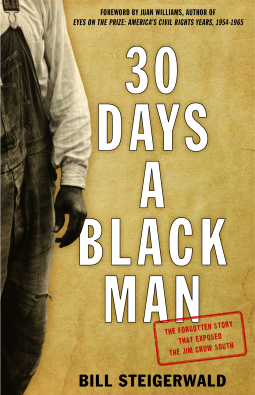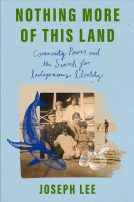
30 Days a Black Man
The Forgotten Story That Exposed the Jim Crow South
by Bill Steigerwald - Foreword by Juan Williams
This title was previously available on NetGalley and is now archived.
Send NetGalley books directly to your Kindle or Kindle app
1
To read on a Kindle or Kindle app, please add kindle@netgalley.com as an approved email address to receive files in your Amazon account. Click here for step-by-step instructions.
2
Also find your Kindle email address within your Amazon account, and enter it here.
Pub Date Apr 01 2017 | Archive Date Apr 14 2017
Rowman & Littlefield | Lyons Press
Description
In 1948 most white people in the North had no idea how unjust and unequal daily life was for the 10 million African Americans living in the South. But that suddenly changed after Ray Sprigle, a famous white journalist from Pittsburgh, went undercover and lived as a black man in the Jim Crow South.
Escorted through the South’s parallel black society by John Wesley Dobbs, a historic black civil rights pioneer from Atlanta, Sprigle met with sharecroppers, local black leaders, and families of lynching victims. He visited ramshackle black schools and slept at the homes of prosperous black farmers and doctors.
The Pittsburgh Post-Gazette reporter’s series was syndicated coast to coast in white newspapers and carried into the South only by the Pittsburgh Courier, the country’s leading black paper. His vivid descriptions and undisguised outrage at "the iniquitous Jim Crow system" shocked the North, enraged the South, and ignited the first national debate in the media about ending America’s system of apartheid.
Six years before Brown v. Board of Education, seven years before the murder of Emmett Till, and thirteen years before John Howard Griffin’s similar experiment became the bestseller Black Like Me, Sprigle’s intrepid journalism blasted into the American consciousness the grim reality of black lives in the South.
Author Bill Steigerwald elevates Sprigle’s groundbreaking exposé to its rightful place among the seminal events of the early Civil Rights movement.
Available Editions
| EDITION | Other Format |
| ISBN | 9781493026180 |
| PRICE | $26.95 (USD) |
Links
Featured Reviews
 Paul M, Reviewer
Paul M, Reviewer
In 1948, Pulitzer Prize winning journalist Ray Sprigle went undercover. He pretended to be black and traveled through the South, in order to get a first-hand look at life under Jim Crow. His serialized reporting made a splash, exposing readers in the North to the horrors and injustices of Jim Crow. Bill Steigerwald revisits Sprigle's audacious project in 30 Days a Black Man: The Forgotten Story That Exposed the Jim Crow South
In a very short time, even with the knowledge that he could go home to his white family in Pittsburgh at any time, he embraced his temporary identity as a black man. It didn't take him long start feeling alienation from whites and hatred for the South. "He had just taken his first steps on pure Jim Crow soil. But already he found himself feeling contempt for the white race and starting to think like a black man." The longer he stayed in the South, and the more he saw of Jim Crow in action, the more he became "used to thinking of himself as black--and resenting the white race."
As an outsider, "the many absurdities--idiocies might be a better word" of Jim Crow were glaring to him. White people wouldn't eat or drink after a black person, even after the dishes were washed. Yet who prepared all the food? Black people. They couldn't sit next to a black person on the bus. Yet black dentists and doctors treated white patients. White parents would not allow their children to play with black children. Yet many white children were raised by black domestics.
Sprigle acknowledged that racism was alive and well in all parts of the country. But Jim Crow was entirely difference; it's "the important difference between de jure and de facto segregation. . . . In short, discrimination against the Negro in the North is usually in defiance of the law. In the South it is enforced and maintained by the law."
Sprigle's series of stories sparked a national conversation, including commendations and rebuttals from North and South. He was way ahead of his time, maybe too much so. Steigerwald writes, "There's no evidence Sprigle's series dramatically changed history or radically influenced the people who where shaping it in 1948." But his exposure of the sick and dying system of Jim Crow, "he'll go down in history as the first journalist--white or black--to strike a serious blow against segregation in the mainstream media."
Steigerwald's account is readable and enjoyable, placing Sprigle's project in historical context and giving him well-deserved credit for his work. 30 Days a Black Man is not a comprehensive history of the Jim Crow South in the post-World-War-2 era, but Steigerwald's account of Sprigle's experiences give us a unique perspective on a period of history many would like to forget.
Thanks to NetGalley and the publisher for the complimentary electronic review copy!
 veronica l, Reviewer
veronica l, Reviewer
I have to admit that reading this book was at times (for me) uncomfortable and really hit me emotionally yet it is a book that I will definitely read again and recommend others to read as well. I am humbled and awed at the courage of these two men who had the courage to go undercover and expose the horrible prejudice and bigotry of the South. Highly recommended.
Readers who liked this book also liked:
Tahir Hamut Izgil
Biographies & Memoirs, History, Nonfiction (Adult)
John Kotter; Holger Rathgeber
Business, Leadership, Finance, Nonfiction (Adult)


















